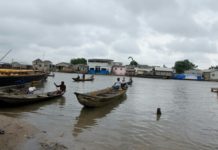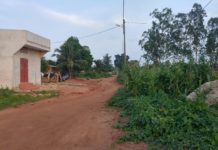Photo credit: DiasporaEngager (www.DiasporaEngager.com).
Access to quality planting materials in the Democratic Republic of Congo (DRC) is one of the main key elements to the successful production of banana, cassava and sweetpotato crops. This is in a situation already compounded by the socio-economic challenges brought about by armed conflicts.
International Institute of Tropical Agriculture (IITA) and International Potato Center (CIP), in collaboration with research organization INERA and regulatory body SENASEM, partner with relief organizations to support root, tuber, and banana (RTB) seed multipliers in Eastern DRC as a long-term solution for improved food security and income generation in the volatile region.
Increasing the use of high-quality planting materials is necessary to address the challenges facing the region’s cassava, banana, and sweetpotato value chains and to improve smallholders’ livelihoods through greater and more sustainable productivity.
Those are the challenges that IITA and CIP took up in Eastern DRC, in partnership with other humanitarian organizations Mercy Corps, World Vision, and FAO, as well as seed multipliers and the National Institute for Agronomic Study and Research (INERA, Mulungu).
The activity is undertaken in the Miti area, Kabare territory.
“Rapid seed multiplication plots for sweetpotato cuttings are currently ongoing for 5 varieties (Kakamega7, Kabode, Terimbere, Kakamega and vanderwall) on 5 demo plots covering a total area of 0.15ha. This provides planting material for varietal evaluation trials to be established in September 2023, and contributes to decentralized approaches for humanitarian interventions and help provide durable solutions to the humanitarian crisis experienced in the region,” explained Doudou Dunia, Socio-economist and Project Assistant at IITA Kalambo.
According to some experts and FAO, rapid seed multiplication is used to overcome the problem of insufficient plant material by rapidly increasing the number of vines from the plant and producing healthy planting material.
The initiative, dubbed “Tools4SeedSystems: working towards resilience through root, tuber and banana crops in humanitarian settings”, pilots localized responses to humanitarian crises by improving the existing food systems.
Under the same initiative in Cameroon, a training-of-trainers session on improved techniques for sweetpotato and plantain rapid seed multiplication, crop diseases, and basic business skills in humanitarian settings has already taken place in collaboration with local actors and government support. As a result, six demo plots have been established in Oku, Ekona, Bandjoun, Bamenda, and Bambui – while subsequent ones will be set up at the sub-divisional level once more vines are harvested for re-planting and establishment of additional plots. Three regional feedback sessions have also been organized in the Northwest and Far North regions to cascade the knowledge acquired to more locally affected communities.
Both interventions in Cameroon and the Democratic Republic of the Congo (DRC) are part of the #Tools4SeedSystems project, funded by USAID’s Bureau for Humanitarian Assistance (BHA), and executed by the International Potato Center (CIP) in collaboration with the International Institute of Tropical Agriculture, the Alliance of Bioversity and CIAT, Wageningen University and Research, and the University of Florida.
Disclaimer and acknowledgments This activity was made possible through support provided by the Bureau for Humanitarian Assistance, U.S. Agency for International Development, under the terms of Award No. BHA 720BHA22IO00136. The opinions expressed in this event are those of the authors and do not necessarily reflect the views of the US Agency for International Development. This activity was made possible through support from CGIAR Seed Equal Initiative. We thank all donors and organizations which globally support its work through their contributions to the CGIAR Trust Fund.
Source of original article: International Potato Center (cipotato.org).
The content of this article does not necessarily reflect the views or opinion of Global Diaspora News (www.GlobalDiasporaNews.com).
To submit your press release: (https://www.GlobalDiasporaNews.com/pr).
To advertise on Global Diaspora News: (www.GlobalDiasporaNews.com/ads).
Sign up to Global Diaspora News newsletter: (https://www.GlobalDiasporaNews.com/newsletter/) to start receiving updates and opportunities directly in your email inbox for free.


































